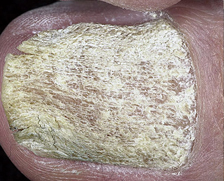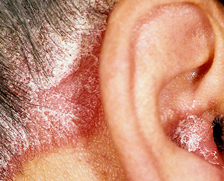Psoriasis is a chronic, autoimmune disease that appears on the skin. Psoriasis is not contagious, commonly causes red, scaly patches to appear on the skin, although some patients have no dermatological symptoms. The scaly patches commonly caused by psoriasis called psoriatic plaques, are areas of inflammation and excessive skin production. Skin rapidly accumulates at these sites which gives it a silvery-white appearance. Plaques frequently occur on the skin of the elbows and knees, but can affect any area including the scalp, palms of hands and soles of feet, and genitals.
Psoriatic arthritis a secondary condition due to long term psoriasis involves joint and connective tissue inflammation. Psoriatic arthritis can affect any joint but is most common in the joints of the fingers and toes making sausage-shaped swelling of the fingers and toe this condition can also affect the hips, knees and spine
These triggers may include emotional stress, injury to the skin, some types of infection and reaction to certain drugs, smoking, alcohol
From an Ayurvedic perspective Psoriasis could be caused due to the dysfunctioning of vata and kapha doshas. Accumulation of toxins or ama, could also lead to this disease condition. This excessive toxins will vitiate doshas leading to a condition of skin eruptions and itching, in ayurveda itching will be due to kapha dosha and dryness will be due to vata dosha ,in majority cases the patient will be vata kapha in nature, this vitiation will be making the blood impure or loaded with toxins which should be eliminated, the process of panchakarma will make the body detoxified. Excessive intake of yogurt, seafood, salty foods, black gram and sour food can cause an aggravation in the disease condition. Psoriasis may also develop due to excess stress.
An effective Ayurvedic treatment for this condition is PANCHAKARMA which helps in detoxification of body fluids. Initially the person is given medicated ghee for about five to seven days, followed by inducing vomiting and detoxifying the body, a process known as Vamana and Virechana. Thereafter a procedure wherein medicated buttermilk is dripped overhead called Dahara is done, after which the entire body is pasted with medicines. Finally medicated enemas are given for a week and internal medications in the form of herbal decoctions and medicated ghee .
During the entire treatment period certain diet restrictions has to be followed. Diet should be strictly vegetarian and yogurt, chillies, black gram and excess salt intake should be avoided. Refrigerated and cold foods should also be avoided
Methotrexate
Potentially serious side effects, including liver damage Patients must be carefully monitored during therapy These medicines available today are acting at the level of basal cell layer of epidermis to stop their division and hyperkeratinisation or at the lavel of horn cells to remove them smoothly.
Coal Tar
Corticosteroids
Acitretin
Cannot be prescribed to women who plan to become pregnant within 3 years


Psoriasis nails Psoriasis scalp
Effective treatment modality for tenniselbow,carpel tunnel syndrome (CTS),trigger finger without surgery Our own special..............